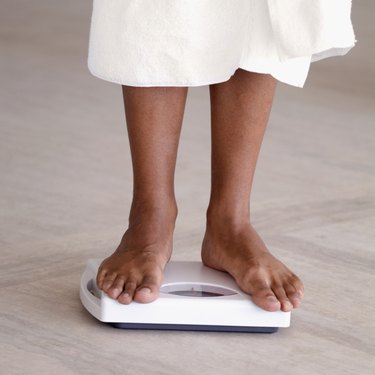
Lisdexamfetamine dimesylate, marketed under the trade name Vyvanse by Shire Pharmaceuticals, is a medication approved by the Food and Drug Administration to treat the symptoms of Attention Deficit Hyperactivity Disorder in both children and adults. Vyvanse is not FDA-approved as a weight-loss medication, yet due to the drug's nature and properties, the drug may cause weight loss as a side effect.
Identification
Video of the Day
Vyvanse, an amphetamine stimulant drug, contains the active ingredient lisdexamfetamine dimesylate, which is medically termed a "prodrug." This means that the drug does not become active until it enters the body. Designed to discourage amphetamine abuse through insufflating or "snorting" the drug, Vyvanse is formulated to become active only when the digestive system breaks down lysine molecules attached to the active ingredient.
Video of the Day
Effects on Appetite
Like other drugs in the amphetamine family, Vyvanse works in the brain by stimulating the release of two neurotransmitters, or brain chemical messengers: dopamine and norepinephrine. Through this method of action, the medication can increase focus and attentiveness for people with ADHD, but it also can suppress appetite. Children and adults -- especially those just beginning treatment with Vyvanse -- may experienced a diminished desire to eat, which can lead to rapid weight loss.
Weight Loss
While one side effect of Vyvanse suppresses the desire to eat, other effects can simultaneously increase heart rate and blood pressure as well as raise body temperature. The body's metabolism is closely tied to body temperature, and some people who still eat regularly while taking Vyvanse may experience weight loss without changes to their diet due to the physical effects the medication has on the body.
Dose Considerations
Weight loss caused by taking Vyvanse for ADHD symptoms may be a sign that the dose of the medication needs to be adjusted. Talk to your physician about any weight loss with Vyvanse -- your doctor will work to find the lowest effective dose to continue to manage symptoms of ADHD while eliminating the side-effect of weight loss. In certain cases, your doctor may try a non-stimulant ADHD medication such as atomoxetine, which does not produce the weight loss associated with amphetamine drugs.
Warning
Vyvanse, like other amphetamine drugs, can be habit forming. Never increase your dose of Vyvanse unless instructed to do so by your prescribing physician. Also, since Vyvanse is not FDA-approved as a weight-loss drug, do not use the medication to intentionally suppress your appetite in order to lose weight. Doing so can pose serious risks to both your physical and psychological health.